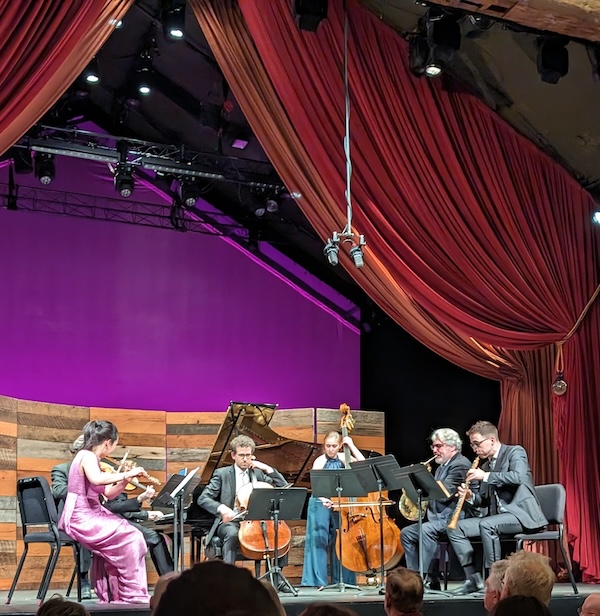Chamber Music Society of LC serves up gourmet feast of rarities at Wolf Trap

The Chamber Music Society of Lincoln Center performed Hummel’s Septet in D minor Sunday at Wolf Trap. Photo: WCR
The Barns at Wolf Trap has become a sort of southern outpost for Chamber Music Society of Lincoln Center under the tenure of artistic director Wu Han. That is not a complaint, for this elite organization has the roster to present an endless variation of intriguing programs. Sunday afternoon’s concert featured a veritable cabinet of curiosities: five eclectic works, culminating in Johann Nepomuk Hummel’s rarely heard Septet in D Minor.
In the first half, each of the seven musicians needed for the Septet combined in smaller works, equally obscure, with pianist Juho Pohjonen getting the most time on stage. Horn player Radovan Vlatković opened the concert with Beethoven’s rarely heard Horn Sonata. This challenging piece was composed for the virtuoso Giovanni Punto in 1800, who played it on a natural horn with a low range.
Playing on a modern valved horn and sans score, Vlatković rendered the piece with nearly faultless execution. He glided through many arpeggiated passages in the first movement, but it was the subtle way with the tender second theme that stood out, as Vlatković softened each repeated note just slightly. He and Pohjonen enhanced this effect each time the motif reappeared, and the second movement added to the sense of the horn as a sensitive melodic instrument, with more patiently ordered fireworks in the third movement.
The most singular oddity on the program was Rossini’s Duetto in D Major for cello and double bass. Written for an amateur cellist while Rossini was in England, it is no mere party trick but a beautifully constructed duet for two equal partners, which the music found in cellist Nicholas Canellakis and double-bass player Nina Bernat.
Contrapuntal exchanges in the first movement ensured that Bernat had to do almost everything Canellakis did, including a perilous climb far up the highest string. Textural variety gave the middle slow movement a poignant delicacy, as Canellakis in particular savored his melodic role. Just when the listener may have forgotten Rossini the comic opera composer, he appeared in the third movement, a playful romp where the cello got the spotlight again, gracefully accompanied by Bernat’s larger instrument.
Oboist James Austin Smith joined Pohjonen for Benjamin Britten’s Two Insect Pieces. The two movements, as indicated by their titles, evoke a grasshopper and a wasp. Pohjonen pecked at the jumping motif of mildly clashing dissonances, while Smith leapt from one perfectly placed staccato note to another, all perfectly in tune well into the top range. Buzzing trills emanated from Pohjonen’s keyboard in the second movement, a sensitively paced accompaniment for his oboist.
Finally violist Paul Neubauer and flutist Sooyun Kim took the stage to play Duruflé’s Prélude, Récitatif et Variations. Pohjonen began the piece at the piano, a restless prelude of murmuring dissonances obscuring the underlying harmony of C sharp major, marked “slow and sad.” Neubauer’s viola and Kim’s flute wove melancholy tunes into the mix, building to a climax before the somber recitative section began.
The theme of the concluding variations had the fluidity of plainchant, which few other composers excelled at setting as naturally as Duruflé. The three musicians traced the contrasting variations on this theme with masterful clarity and athletic virtuosity, bringing to an end a remarkable first half.
For all of his work up to this point, Pohjonen’s real chance to shine came in Hummel’s Septet, which combined all of the instruments. The Finnish pianist, speaking at the Q&A before the second half, described the piece as something like a piano concerto with a seven-player orchestra. He leaned towards a subtle approach to the endless roulades and big chords in the first movement, with the other musicians layering on their own parts in a carefully balanced whole, rather than hammering relentlessly to display his virtuosity.
Devilish flair marked the second movement, with the same kind of lightness across the ensemble. Other instrumental solos came to the fore in the trio section, set in the parallel major, especially the cello and horn. The third movement, a tender theme and variations, brought out some melodic parts for the double-bass, with Bernat’s solid playing like the anchor at the other pole of the work against Pohjonen’s constant movement, with spectacular variations in lacy repeated-note motifs and gossamer trills.
Octaves in both hands posed no problems for the pianist either in the racing Finale. A somewhat academic fugal section featured the chance to savor the playing of each of Pohjonen’s colleagues again each time it occurred. Canellakis produced some of his finest playing in the brief moment of respite in this turbulent movement, on a gently rising melody in radiant A major. The theme sounded even more angelic transposed up into D major, leading to the piece’s conclusion.
Wolf Trap Opera Alumni perform songs of Aaron Copland and Ricky Ian Gordon 7:30 p.m. April 5. wolftrap.org
